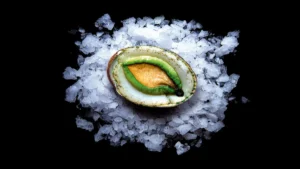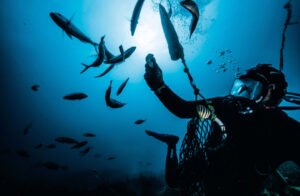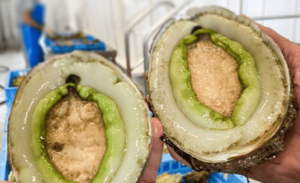Rare Foods Australia offers chance of premium haul for investors

Pic: Rare Foods Australia
Rare Foods Australia is serving up a red hot upside of 358%, says the latest MST Access report of the business producing and marketing premium abalone from the South-West corner of WA, while also branching out into innovative new products.
The MST research has calculated a 12-month forward discounted cash flow (DCF) valuation of $0.33, up ~358% on the current share price of $0.072.
The widely used DCF model works out the value of an investment by calculating expected future cash flows, which are then discounted to take account of the timeframe.
The conservative cross-check calculates a valuation of $0.13, which is still up a very healthy 80.5% on the current price.
MST based its valuation on Rare Foods Australia’s (ASX:RFA) continued strengthening of its core business in the second quarter of 2023, which saw more record sales for its ranched wild greenlip abalone.
New on menu
The new record was underpinned by 25 tonnes of wild greenlip abalone sales, up 22% year-on-year. That’s consistent with RFA’s annual run rate of 95 tonnes sold for FY23, up from 81.7 tonnes in FY22.
On top of that, for the first time, RFA added wild origin abalone sales to its revenue through collaboration with local quota holders and divers. The new wild origin abalone offering boosted revenue by $237k, bringing the total for the quarter to $1.68m.
Scalable and sustainable
The research paper notes the outlook remains strong with existing year-to-date sales and forward non-binding orders already 107% of FY22 sales.
RFA can continue to meet this growing demand thanks to its unique and scalable ranching techniques, which enable the company’s abalone harvests to grow as global quotas decline.
The company continues to improve its juvenile deployment routines, with 1.2m young abalone deployed onto its globally unique ‘abatits’, or artificial reefs on the ocean floor, both ahead of schedule and with fewer resources.
Another advantage for the business, MST points out, is its internationally recognised and coveted Marine Stewardship Council blue tick, enabling RFA to promote its product to a global customer base that increasingly puts a premium on proven sustainability.
Also on the marketing side of the business, MST notes that it continues to be well supported with consistent and repeat demand from master distributors from Hong Kong, the US and UK, who in turn service upmarket restaurants. For RFA this distribution model creates economies of scale while cutting the logistical costs and time involved with selling to many smaller buyers. To build its network, RFA is continuing negotiations with master distributors in Singapore, Japan and Vietnam.
Premium drops in the ocean
Demonstrating its innovations aren’t just abalone-related, RFA is at the forefront of ‘ocean-cellaring’ Australian wines. This involves RFA divers placing local Margaret River wines on the ocean floor to be naturally matured by the currents – a method pioneered overseas by Veuve Cliquot after surprisingly good bottles were discovered in an old shipwrecked warship.
The inaugural sales of 540 bottles of Margaret River ocean-cellared wines were achieved last Quarter. Based on local enthusiasm and interest from major international players for this product, RFA has deployed more bottles through agreements with Glenarty Road and Edwards Winery, also in WA’s South-West.
Meanwhile RFA has started showcasing its products and innovations to the tens of thousands of local and overseas tourists who visit the South-West of WA each year after opening the doors of its Ocean Pantry retail outlet and café, which also offers tours of its operations at the Augusta marina.
This article was developed in collaboration with Rare Foods Australia, a Stockhead advertiser at the time of publishing.
This article does not constitute financial product advice. You should consider obtaining independent advice before making any financial decisions.
Related Topics
UNLOCK INSIGHTS
Discover the untold stories of emerging ASX stocks.
Daily news and expert analysis, it's free to subscribe.
By proceeding, you confirm you understand that we handle personal information in accordance with our Privacy Policy.








